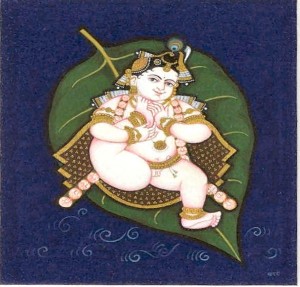
karaaravinde padaaravindam, mukhaaravinde vinivisheyantam, vatasya patrasaya pute shayanam, baala mukunda manasaa smaraami. - KK
Where did Lilâshuk reside? Many South Indian Pandits feel that he belonged to Keralâ and established the Math (Temple) at Natville in Trichur as his residence. Just as the Presidents of the four Maths established by Shankarâchârya are conferred the title of ‘Shankarâchârya’, the president of the Natville Math is given the title ‘Bilvamangal Swâmiyâr’. The sanyâsis of this Math reserve the right to offer flowers before anyone else in the Padmanâbha Mandir of Thiruvananthapuram (Trivandrum).
However, Srila Kavirâj Goswâmipâd has stated that Lilâshuk resided on the Western banks of River Krishnavenvâ. That branch of River Krishnâ (arisen from Mahâbaleshwar in the Sahyâdri Mountains) that meets Bay of Bengâl to the South of Machhalipatam is called River Krishnaveni or Bhimâ. Hence, Nidal, Bâlâ, Sulapâ etc. that are situated in the West of Solâpur are the regions indicated by Srila Kavirâj Goswâmi. Srila Kavirâj Goswâmi has written in his Sâranga Rangadâ purport that Sri Bilvamangal was a learned, top-level poet and brahmin residing on the banks of River Krishnavenvâ. In the early part of his life, he had become addicted to a prostitute called Chintâmani who was a talented singer and danseuse. She lived on the eastern bank of the same river. It was a dark monsoon night, on the last day of mourning for his father’s death. In spite of this, he crossed the agitated and surging Krishnavenvâ with lots of difficulty by taking the support of a dead body, only to find Chintâmani’s gates closed. A snake had inserted half its body inside a crevice in the wall. Bilvamangal caught hold of its tail, mistaking it for a rope, climbed the wall and fell unconscious in the compound. Chintâmani’s maidservants came to know how Bilvamangal had come to be in this state. Due to their care, when he regained consciousness, Chintâmani lamented thus – “Shame on me! I am such a sinner! How I have cheated men of their wealth and love. O son of a brahmin, how anxious you are to meet me! Had you possessed the same eagerness for Sri Bhagavân then how wonderful it would have been! From tomorrow I shall forsake everything and only perform Sri Krishna-bhajan1.”
Sri Bilvamangal too started reviewing his situation. During the night, he heard the glorification of Râs Lilâ and other pastimes from Chintâmani. The seed of love acquired from his earlier births, sprouted in his heart and attracted him solely towards adoring the lotus feet of Sri Râdhâ’s Beloved (Sri Krishna). In the morning, he paid obeisance to Chintâmani and approached Somagiri, a Vaishnav. He narrated everything about himself and obtained the mantra of Sriman-Madan-Gopâl. Since he had deep anurâg2, he showed the signs of bhâv such as tears and goose flesh as soon as he obtained the mantra. Although he was anxious to go to Vrindâvan, he stayed on for some days to serve his Spiritual Master. There he composed a few books describing the pastimes of Sri Krishna. Impressed by his devotional state, Somagiri conferred the title ‘Lilâshuk’ on him.
At last, he took the permission of Sri Gurudev and started for Sridhâm Vrindâvan. On the way, he became overwhelmed by the high tide of prem3 and was filled with tremendous longing for His sweet Lord (later on, he would find life meaningless without Sri Krishna). Gradually, when he reached Mathurâ, he was inspired by special Divine Pastimes and literally went mad after which he became ever thankful when he actually met Sri Krishna. Sri Krishna-Karnâmritam, a gem of a text, is the result of all those utterings in a love-crazy state. Srila Kavirâj Goswâmi says that this wealth is in strict accordance with the Guru-Paramparâ and is renowned in the world. Sadly, we do not know the identity of the poet’s parents. In the 110th verse, we find the word ‘Nibi-Dâmodar’. Some say that Nibi and Dâmodar were his mother and father respectively and that the poet has introduced his parents in the last verse of the text.
(to be continued)
1 devotional practice unto Sri Krishna
2 deep love for Lord Krishna
3 pure love for Lord Krishna
